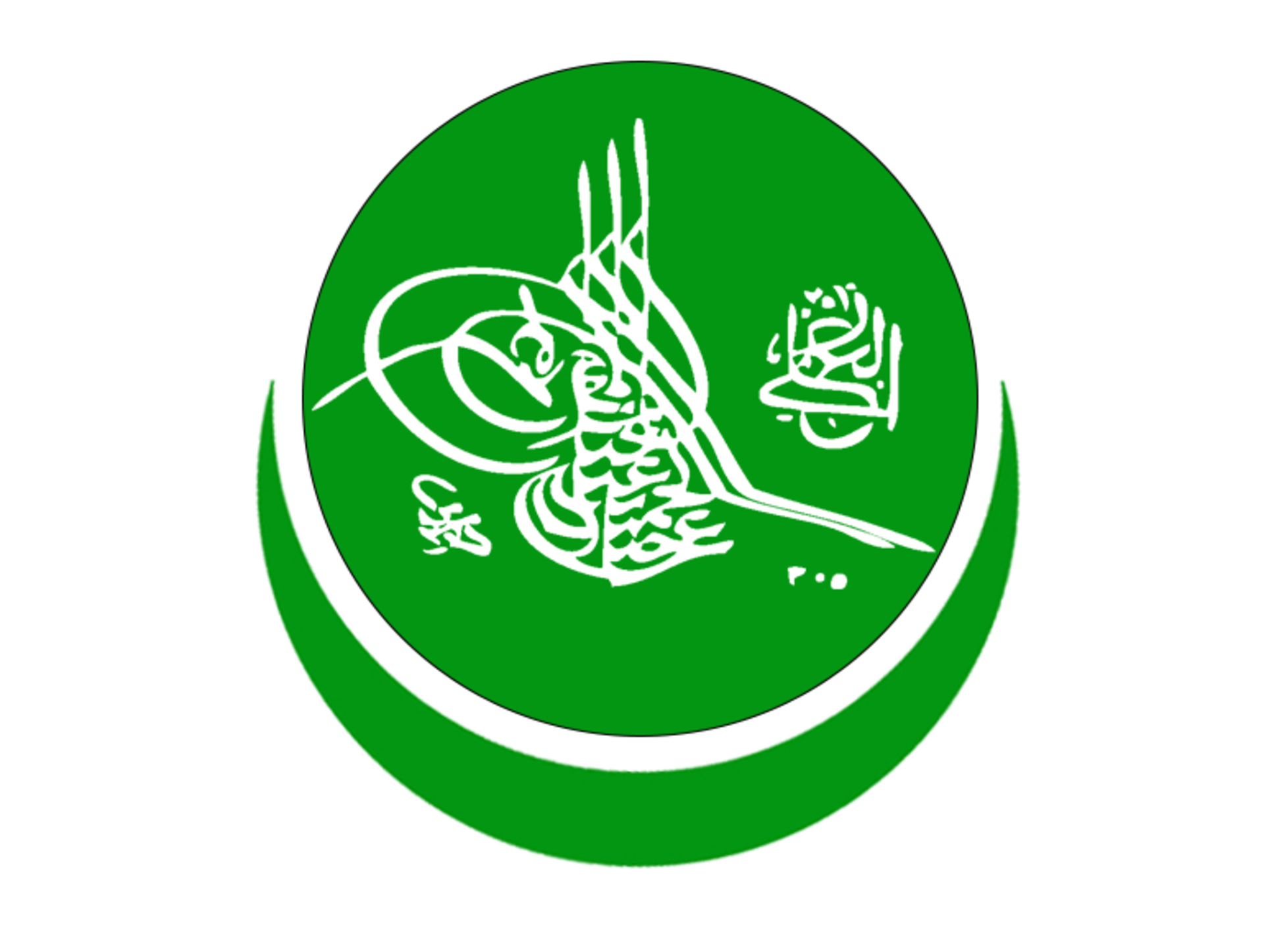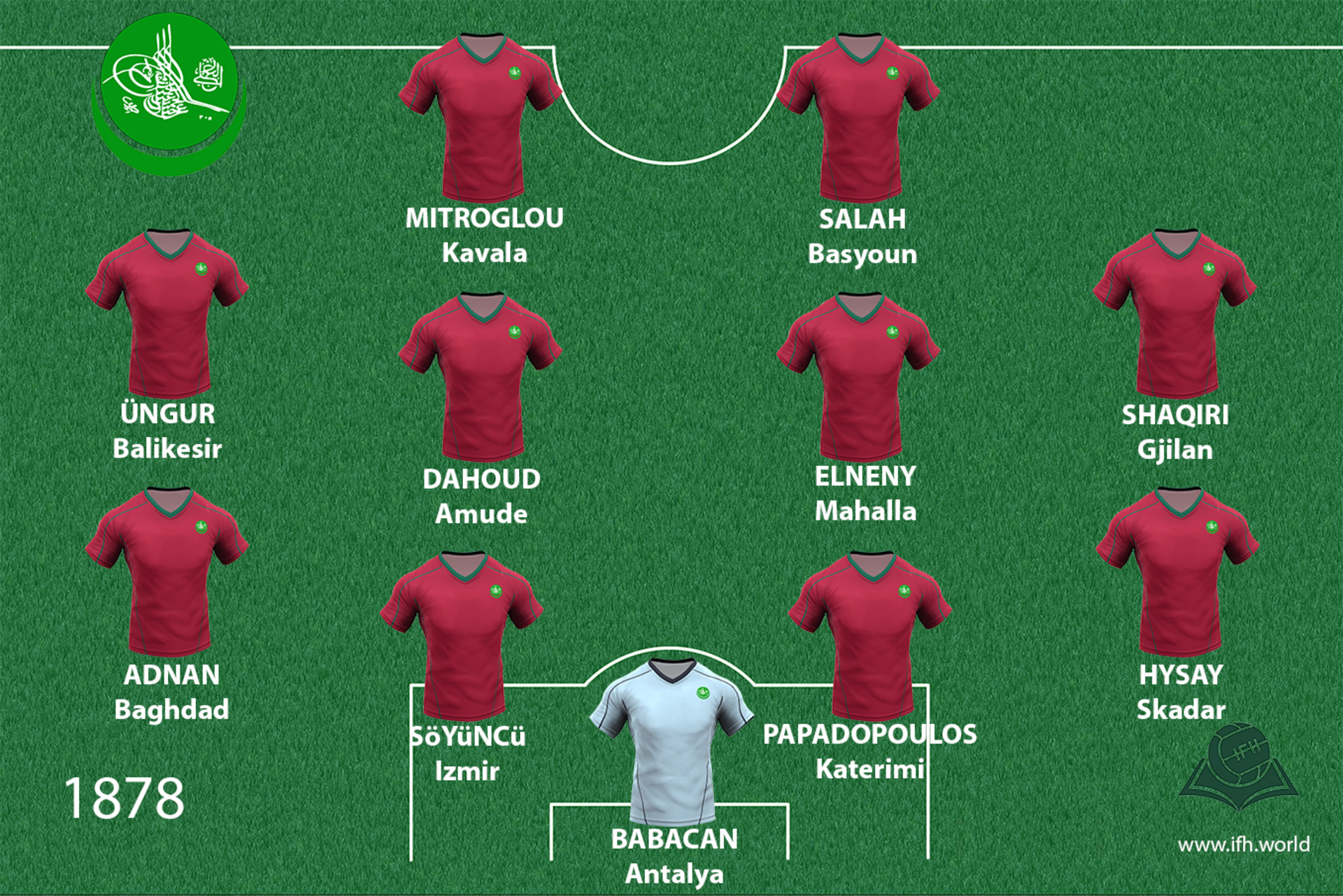Ottoman Empire
The Ottomans were facing internal problems in the first half of the 19th century, due to conflicts between reformers and conservatives, who were opponents in the struggle for the same goal – the conservation of the Ottoman Empire.

Coat of arms

Shirt
| Position | First name | Last name | Mjesto rođenja | Like | Dislike | |
|---|---|---|---|---|---|---|
| GK | Etrit | BERISHA | Pristina |
17 |
26 |
|
| GK | Volkan | BABACAN | Antalya |
8 |
14 |
|
| DC | Ahmet | CALIK | Ankara |
7 |
6 |
|
| DC | Kyriakos | PAPADOPOULOS | Katerini |
15 |
2 |
|
| DC | Serdar | AZIZ | Bursa |
1 |
1 |
|
| DRL/MR | Stefan | RISTOVSKI | Skopje |
28 |
10 |
|
| DR | Elseid | HYSAY | Reç (Shkodër) |
14 |
9 |
|
| DR | Gokhan | GONUL | Bafra |
3 |
3 |
|
| DL | Ali | ADNAN | Baghdad |
0 |
0 |
|
| DL/ML | Konstantinos | STAFYLIDIS | Thessaloniki |
9 |
6 |
|
| DL/MLC | Caner | ERKIN | Balıkesir |
11 |
13 |
|
| DC/DMC | Caglar | SÖYÜNCÜ | Izmir |
7 |
13 |
|
| DMC | Bibras | NATCHO | Kfar Kama |
0 |
0 |
|
| DMC | Mohamed | ELNENY | Mahalla |
0 |
0 |
|
| DMC | Ozan | TUFAN | Bursa |
8 |
12 |
|
| DMC | Selcuk | INAN | İskenderun |
11 |
12 |
|
| DMC/DC | Mehmet | TOPAL | Malatya |
4 |
8 |
|
| MC | Mahmoud | DAHOUD | Amude |
1 |
1 |
|
| MRLC | Cengiz | ÜNDER | Balikesir |
4 |
5 |
|
| AMRLC | Arda | TURAN | Fatih |
18 |
5 |
|
| AMRLC | Kostas | FORTOUNIS | Trikala |
23 |
10 |
|
| AMRL | Xerdan | SHAQIRI | Gjilan |
44 |
26 |
|
| FRLC | Admir | MEHMEDI | Gostivar |
5 |
15 |
|
| FRLC | Enes | ÜNAL | Bursa |
8 |
9 |
|
| FRLC | Mohamed | SALAH | Basyoun |
19 |
4 |
|
| FC | Bekim | BALAJ | Shkodër |
0 |
0 |
|
| FC | Burak | YILMAZ | Antalya |
10 |
10 |
|
| FC | Ilija | NESTOROVSKI | Prilep |
24 |
5 |
|
| FC | Kostas | MITROGLOU | Kavala |
18 |
2 |
(Today part: Turkey, Parts of Greece, Albania, Middle East, North Macedonia Egypt)
Attempts at change ran into recurring political opposition, mostly among the Janissaries who, for example, refused to implement military reforms based on European “infidels”. Therefore, the sultan disbanded them after their massacre in 1826. The seventies saw a general crisis of Ottoman rule in the Balkans. The Ottomans would, after the defeat in the war with Russia and the Berlin Congress (1878), have to accept the independence of Bulgaria, Romania, Montenegro, and Serbia, as well as the Austro-Hungarian occupation of Bosnia and Herzegovina. Great Britain was granted control of the strategically important Cyprus through a secret agreement in 1878 and control of Egypt in 1882, while France gained a protectorate in Ottoman Tunisia (1881).
While the Ottoman Empire was under the protection of Great Britain throughout the 19th century, Great Britain began an anti-Ottoman foreign policy in the beginning of the 20th century due to improvement of relations between the Ottomans and Germany. It would take the form of indirect destabilization of the Ottoman Empire through encouragement and support of pan Arabic movements or Orthodox Balkan countries. Since modernizing reforms failed, despite attempts of the aristocratic Islamic elite in the 19th century, certain liberal circles saw the appearance of the new pan Turkic ideology that would be adopted by the Young Turk organization. Its members would stage a coup and overthrow the sultan (1908), but the implemented nationalist policies would accelerate the estrangement of numerous non-Turkic parts of the Empire, as well as lead to large scale crimes against Greeks, Armenians, Assyrians and Kurds.
Sources
- William F. ENGDAHL, Stoljeće rata : anglo-američka naftna politika i novi svjetski poredak, Zagreb, 2008.
- Niall FERGUSON, Civilizacija: Zapad i ostali, Zagreb, 2012.
- Vasilj POPOVIĆ, Istočno pitanje , Sarajevo, 1956., VI.
- Anthony D.SMITH, Nacionalni identitet, Beograd, 2010.
- Arnold SUPPAN, Oblikovanje nacije u građanskoj Hrvatskoj : (1835. - 1918.), Zagreb, 1999.
- ''istočno pitanje', http://www.enciklopedija.hr/Natuknica.aspx?ID=27996
- Kristijan OBŠUST, ''Idealizovanje antičke Grčke klasičnog perioda kao „kolevke evropske kulture“. Stara Grčka kao univerzalni uzor za stvaranje modernih evropskih nacija'',http://www.journal.casca.org.rs/2012/12/24/idealizovanje-anticke-grcke-klasicnog-perioda-kao-kolevke-evropske-kulture-stara-grcka-kao-univerzalni-uzor-za-stvaranje-modernih-evropskih-nacija/
- Coat of arms: https://en.wikipedia.org/wiki/List_of_sultans_of_the_Ottoman_Empire
